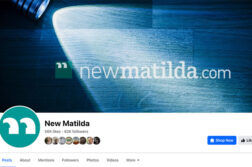So you want to be a journalist? Good luck, kid. It’s never been easy to find a job as a journalist and these days, the supply-demand equation has no flattering angles. Thousands of journalism graduates and aspirants are scrambling for what jobs are left in a profession that’s tanking — or transforming so fast no one really knows what’s going on.
Unpaid work, menial work, endless internships — these have quickly become part of the standard career path for rising journalists. Hard work might be a staple but journalism as a profession has changed. It’s hard to say what a successful career in journalism will look like in a decade.
This week, a media and communications undergraduate from Melbourne named Sasha Burden Uni published an account of her time as an intern at the Herald-Sun in Farrago, the Melbourne University student magazine. The article, titled "The Hun Mole", ran anonymously but the author’s identity has since been revealed.
In brief, she had "a horrific time". Her story contained lots of juicy inside goss from editorial meetings. Hers is a story in which "fairly low expectations" didn’t get met. Her idealism was squashed and so was her plan to work as a journalist. Sexist shits, homophobic banter and dumb jokes were the order of the day. It all sits nicely with the macho romance of the newsroom that gets cultivated by journalists of a certain generation and inclination. Sexist workplace culture is apparently unremarkable — but calling it out is something else.
"The internship was supposed to reveal the inner workings of my chosen profession and to inspire me in my future career path. If this is the case, I may as well kiss my journalism career goodbye," Burden wrote.
It’s lucky that Burden has crossed the Hun off her list because its editor-in-chief wrote a pissed-off letter to the university’s internship co-ordinator, bewailing her failure to give the Hun a right of reply.
"It is ironic that Ms Burden criticises the supposed bias of Herald Sun reporters and lack of balance in Herald Sun reports, yet at no stage in the drafting of her Farrago article did Ms Burden offer HWT a right of reply to any of the criticisms raised,” Gardner wrote in his letter. ”We would have liked the opportunity to address her concerns while she was here but at no time during her two-week internship did she raise … any issues or concerns relating to the nature and the people and processes she was exposed to.”
The story quickly changed from one girl’s disappointing newsroom experience to the unfair victimisation of the nation’s best-selling newspaper, hurt language and all. How can any organisation trust its interns after this? Wasn’t she given a great opportunity to see a "genuine" newsroom in action?
But what kind of opportunity are we really talking about? Now that the old copy-kid to cadet career path has dried up, and the links between student press and big media no longer exist, internships aren’t an added extra. They’re the only way into the industry. Perhaps under the old model Burden might have been developed her skills inside the Hun newsroom and been immunised against its worst excesses. But university j-school programs insist students sanitise and sell themselves to the big media companies for short stints in work experience. No wonder expectations are let down — journalism students don’t get to be in the club, nor are they likely to even get a job. Being humiliated on top of that is just icing on the cake. And that’s before you look at the HECS bill.
If criticism from the Hun’s big guns wasn’t enough, there’s been a barrage of criticism from journalists and media types who characterise Burden as a naive ingenue who needs to harden up. There’s been lots of scoffing too about her use of the word "heteronormative". Dishing the dirt on journalists doesn’t make you popular and many revealed their glass jaws. Those who weren’t taking potshots at Burden for being precious and pretentious stuck to being condescending.
Alexandra Wake from RMIT called it a hard lesson in newsroom culture. "Many workplaces are filled with older staff, many of whom have joked and laughed through too many tragedies, usually as a way of coping. It’s part of the challenge of the new generation to change inappropriate attitudes." She thinks the "the Herald Sun should be commended for offering a "warts and all" opportunity in their newsroom to potential journalists." The host of Radio National’s PM, Mark Colvin, said "I’ve never known a newsroom where people didn’t say insensitive things and use dark humour’.’
Andrew Landeryou worries that the story "might make many other newsrooms less enthusiastic about trusting journalism students with a genuine exposure to what goes on in their world."Landeryou is a big fan of tabloid culture, dishing up a cheap and easy attack on Burden’s based on her other contributions to Farrago. It’s sleazy stuff — and a big load to dump on an undergraduate.
When such a various and distinguished retinue of older journalists weighs in to criticise a young and inexperienced student journalist for being, well, young and inexperienced, something is amiss. But it’s nothing new. Generation X got used to being slagged off by Baby Boomer cultural elites — the topic of Mark Davis’ important 1997 book Gangland.
"Younger people just can’t get it right. They’re either full of piercings or complete prudes. Whatever the case, they just aren’t it," he wrote. It’s no delight to see Burden being hauled over the coals in the same way. Shouldn’t older journalists be listening to what young people entering the profession have to say? Dylan Welch from the SMH was one of the exceptions. He tweeted, "no surprise the Australian media is so often criticised when this is how we behave when we are criticised."
The response to the Farrago article speaks volumes about generational misrecognition and disdain. Young journalists are useful for their tech-savvy, or their angle on "youth issues", but not their values. This is why it’s particularly striking that Burden’s sign-off has got less attention than the rest of her article.
"If Australia’s big mastheads all function like this then I say bring on their decline. Rip down the banners that have led to media exclusivity and elitism. Huzzah to the future of online, diverse reporting."
Like it or not, this is as an acute analysis of what’s ailing the media as you’ll find anywhere. And it was penned by someone who will be a part of the future of journalism, not someone clinging to a nostalgic idea of the way things have always been.
Donate To New Matilda
New Matilda is a small, independent media outlet. We survive through reader contributions, and never losing a lawsuit. If you got something from this article, giving something back helps us to continue speaking truth to power. Every little bit counts.



